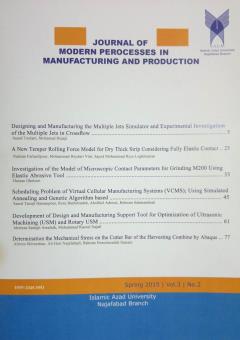Prediction of Defects in the Plastic Injection Process by Mold Flow Software Based on the Experimental Data
Subject Areas :
Ahmad Afsari
1
*
![]() ,
Sayed Ahmad Behgozin
2
,
Sayed Ahmad Behgozin
2
![]() ,
Mohammad Ramezani
3
,
Seyed Alireza Hamidi
4
,
Mohammad Ramezani
3
,
Seyed Alireza Hamidi
4
1 - Department of Mechanical Engineering, Shiraz Branch, Islamic Azad University, Shiraz, Iran
2 - Department of Mechanical Engineering, Shiraz Bahonar Engineering College, Technical and Vocational University (TVU), Shiraz, Iran;
3 - Department of Mechanical Engineering, Shiraz Branch, Islamic Azad University, Shiraz, Iran
4 - Department of Mechanical Engineering, Mashhad Branch, Islamic Azad University, Mashhad, Iran
Keywords: Plastic Injection Molding, Polycarbonate, Defect Analysis, Moldflow Software, Parameter Instructor Software,
Abstract :
Several factors influence the quality of the final parts of the plastic injection process, as many variables play a role in controlling this process. These factors can include the machine, mold, operator, raw materials, and working environment. An extensive study revealed that molding machines significantly impact quality compared to other factors. Adjusting and optimizing the machine parameters makes it possible to achieve parts with the desired or acceptable quality. The main goal of this project is to develop an application system that selects the regulatory parameter values for machines handling polycarbonate and other polymers. Additionally, the defects will be predicted in injected parts, and their properties will be analyzed using Moldflow software. Another software, based on practical data, will take initial user input and provide the necessary machine parameters to the operator from a reliable information source. During the production stage, if a defect occurs, the software will generate instructions tailored to the defect type and the conditions and parameter values. If the defect persists after following the provided instructions or if the nature of the defect changes, the software will adapt its guidance until defects are resolved, creating perfect parts without any flaws.
[1] Zhao, N. Y., Lian, J. Y., Wang, P. F., and Xu, Z. B. 2022. Recent progress in minimizing the warpage and shrinkage deformations by the optimization of process parameters in plastic injection molding: A review. The International Journal of Advanced Manufacturing Technology. 120(1):85-101. doi: 10.1007/s00170-022-08859-0.
[2] Rohde, S., Cantrell, J., Jerez, A., Kroese, C., Damiani, D., Gurnani, R., and Ifju, P. 2018. Experimental characterization of the shear properties of 3D–printed ABS and polycarbonate parts. Experimental Mechanics. 58:871-884. doi:10.1007/s11340-017-0343-6.
[3] Dar, U. A., Xu, Y. J., Zakir, S. M. and Saeed, M. U. 2017. The effect of injection molding process parameters on mechanical and fracture behavior of polycarbonate polymer. Journal of Applied Polymer Science. 134(7). doi: 10.1002/app.44474. doi:10.1002/app.44474.
[4] Farotti, E., and Natalini M. 2018. Injection Molding. Influence of process parameters on mechanical properties of polypropylene polymer. A First Study. Procedia Structural Integrity. 8:256-264. doi: 10.1016/j.prostr.2017.12.027.
[5] Kitayama, S., Yamazaki, Y., Takano, M. and Aiba, S. 2018. Numerical and experimental investigation of process parameters optimization in plastic injection molding using multi-criteria decision making. Simulation Modelling Practice and Theory. 85:95-105. doi: 10.1016/j.simpat.2018.04.004.
[6] Kouchaki, M. 2019. Controlling the warpage of plastic parts in injection molding process using the variation in coolant temperature of core and cavity. Iranian Journal of Manufacturing Engineering. 6(5):39-46.
[7] Macedo, C., Freitas, C., Brito, A. M., Santos, G., Faria, L., Laranjeira, J. and Simoes, R. 2019. Influence of dynamic temperature control on the injection molding process of plastic components. Procedia Manufacturing. 38:1338-1346. doi: 10.1016/j.promfg.2020.01.155.
[8] Shen, S., Kanbur, B. B., Zhou, Y. and Duan, F. 2020. Thermal and mechanical analysis for conformal cooling channel in plastic injection molding. Materials Today. Proceedings. 28:396-401. doi: 10.1016/j.matpr.2019.10.020.
[9] Karagöz, İ. 2021. An effect of mold surface temperature on final product properties in the injection molding of high-density polyethylene materials. Polymer Bulletin. 78:2627-2644. doi: 10.1007/s00289-020-03231-2.
[10] Ansari, M. J. and Jabbaripour, B. 2019. Manufacture and comparison of mechanical properties of reinforced polypropylene nanocomposite with carbon fibers and calcium carbonate nanoparticles. Iranian Journal of Manufacturing Engineering. 6(5):1-12.
[11] Rashid, O., Low, K. W. and Pittman, J. F. 2020. Mold cooling in thermoplastics injection molding, effectiveness and energy efficiency. Journal of Cleaner Production. 264:121375. doi: 10.1016/j.jclepro.2020.121375.
[12] Szabó, F., Suplicz, A. and Kovács, J. G. 2021. Development of injection molding simulation algorithms that take into account segregation. Powder Technology. 389: 368-375. doi: 10.1016/j.powtec.2021.05.053.
[13] Samei, J., Asgari, H., Pelligra, C., Sanjari, M., Salavati, S., Shahriari, A., Amirmaleki, M., Jahanbakht, M., Hadadzadeh, A., Amirkhiz, B. S. and Mohammadi, M. 2021. A Hybrid additively manufactured martensitic-maraging stainless steel with superior strength and corrosion resistance for plastic injection molding dies. Additive Manufacturing. 45: 102068. doi: 10.1016/j.addma.2021.102068.
[14] Mianehrow, H. and Abbasian, A. 2017. Energy Monitoring of plastic injection molding process running with hydraulic injection molding machines. Journal of Cleaner Production. 148:804-810. doi: 10.1016/j.jclepro.2017.02.053.
[15] Bianchi, M. F., Gameros, A. A., Axinte, D. A., Lowth, S., Cendrowicz, A. M. and Welch, S. T. 2019. On the effect of mould temperature on the orientation and packing of particles in ceramic injection moulding. Journal of the European Ceramic Society. 39(10): 3194-3207. doi: 10.1016/j.jeurceramsoc.2019.03.049.
[16] Khosravani, M. R., Nasiri, S. and Reinicke, T. 2022. Intelligent knowledge-based system to improve injection molding process. Journal of industrial information Integration. 25: 100275. doi: 10.1016/j.jii.2021.100275.
[17] Otieno, S. O., Wambua, J. M. and Mwema, F. M. 2024. A Predictive modelling strategy for warpage and shrinkage defects in plastic injection molding using fuzzy logic and pattern search optimization. Journal of Intelligent Manufacturing. 1-25. doi: 10.1007/s10845-024-02331-4.

